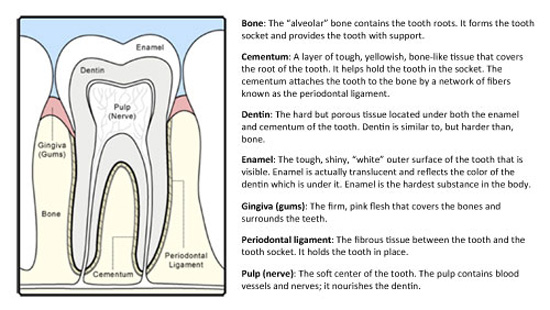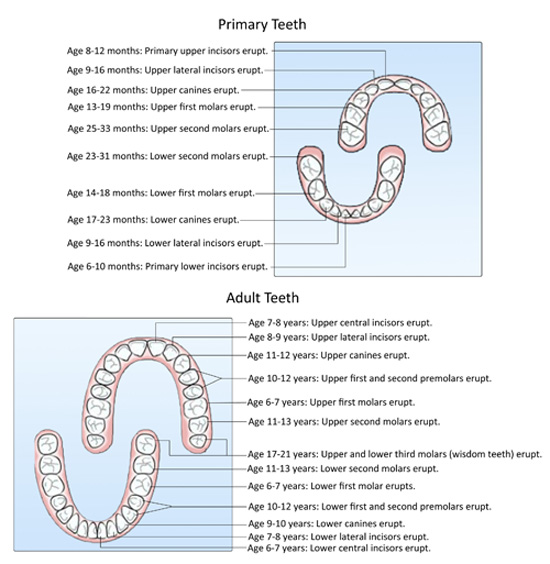Dental FAQs
You've got questions? We've got answers!
Below are common pediatric dental questions that we receive and our responses to them. We are always happy to help answer any additional questions you may have at your child's appointment.
When should I schedule my child’s first visit to the dentist?
We recommend that you make an appointment to see the dentist as soon as your child gets his or her first tooth. The American Academy of Pediatric Dentistry recommends that children be seen by six months after their first tooth erupts, or at one year of age, whichever comes first. At these early visits, our doctors will discuss the do's and don'ts of dental home care, as well as review important topics regarding your child's dental health.
How is a pediatric dentist different from other dentists?
All dental specialists (pediatric dentists, orthodontists, oral surgeons, and others) begin by completing dental school, then continue their education with additional years of specialized training. During training in the field of pediatric dentistry, our doctors gained extensive knowledge and experience in treating infants, children, and adolescents. Drs. Moody and Heim, both Board-Certified pediatric dentists, enjoy working with children and bring to each patient expertise in childhood development and behavior. Because our office is geared toward young patients, you'll find that our staff, as well as our office design, decorations, and activities all work together to provide an especially friendly and comfortable environment for children.
What happens during my child’s first visit to the dentist?
Your child's first visit will vary depending on your child's age. Infants and toddlers will often receive an age-appropriate Lap Exam, consisting of a dental examination, oral hygiene demonstration, and, at times, a fluoride application. Our older patients (3+ years) will receive a more routine dental appointment complete with examination, cleaning, x-rays (when indicated), and fluoride treatment. During you child's first visit, we focus on getting to know your child and giving you as a parent basic, helpful information about dental care. The doctor will check your child’s teeth for cavities, evaluate for any bite or alignment issues, and assess dental home care. We will also answer any questions you have about how to care for your child’s teeth and provide tips, advice, and guidance on how best to ensure optiminal dental health for years to come.
How can I prepare my child for his or her first dental appointment?
The best preparation for your child’s first visit to our office is maintaining a positive attitude. Children pick up on adults’ energy and anxiety, so if you tend to be more nervous about dental visits, your child may sense this and model those same apprehensions. It's best to show excitement for your child's first visit and to make it a fun first experience. After all, that's our ultimate goal too! We want your child's first visit to be a happy one, complete with smiles, high-fives, prizes, stickers, and accalades! We recommend that you show your child the pictures of the office and staff on the website. Let your child know that it’s important to keep his or her teeth and gums healthy, and that the doctor will help with that. Remember that your dentist is specially trained to handle fears and anxiety, and our staff excels at putting children at ease during treatment.
How often should my child visit the dentist?
We generally recommend scheduling check-ups every six months. Depending on the circumstances of your child’s oral health, we may recommend more frequent visits.
Baby teeth aren’t forever. Why do they need special care?
Although they don’t last as long as permanent teeth, your child’s first teeth play an important role in dental development. While they’re in place, baby teeth help your little one speak, smile, and chew properly. They also hold space in the jaw for permanent teeth. If a child loses a tooth too early (due to damage or decay) nearby teeth may encroach on that space, which can result in crooked or misplaced permanent teeth. Also, your child’s general health is affected by the oral health of the teeth and gums. So though they are just baby teeth, they play a critical role in your child's overall dental development.
What’s the best way to clean my baby’s teeth?
Even before your baby’s first tooth appears, we recommend you clean his or her gums after feedings with a damp, soft washcloth. Rubber finger brushes are also helpful and are often soothing to your little one's gums. As soon as the first tooth appears, you can start using a toothbrush. Choose an age-appropriate toothbrush with soft bristles and a small head. You can often find a toothbrush designed for infants at a local store or online or use the one given to you at your child's first dental visit. Your child's teeth should be cleaned both morning and night and particularly after bedtime or middle-of-the-night feedings. Positive dental habits begin early, so start off strong by implementing good routines with your little one.
At what age is it appropriate to start using toothpaste?
Toothpaste may be used as soon as you begin brushing your child's teeth. Our doctors will discuss with you which kind of toothpaste is best for your child. Typically children less than 3 years of age may use a tiny amount of fluoridated toothpaste (i.e. a smear or about the size of a grain of rice). Children 3-6 years of age may use a pea-size amount of fluoridated toothpaste. Always have your child spit out any excess toothpaste after brushing and smaller children may have any excess amount wiped with a wet washcloth.
At what age can I stop helping my child brush?
Young children will need a parent's help with brushing for many years. Even the best little toothbrushers can be missing spots or not brushing thoroughly enough. You should expect to help brush your child’s teeth until he or she has developed the manual dexterity to brush properly, which usually happens by 6-8 years of age. A good milestone to reference is once a child is able to tie his or her shoes alone, he or she is likely ready to brush solo. Our dentists will help assess your child's oral hygiene at check-ups and will make recommendations accordingly.
What causes cavities?
Certain types of bacteria live in our mouths. When these bacteria come into contact with high-carbohydrate or sugary foods left behind on our teeth after eating, acids are produced. These acids attack the enamel on the exterior of the teeth, eventually eating through the enamel and creating holes in the teeth, which we call cavities.
Who is at risk for developing cavities?
All children can be at risk for developing cavities, but certain factors and behaviors can increase a child's risk. High risk factors such as high sugar intake (i.e. sweetened beverages such as juice or chocolate milk, candy, treats, etc.), frequent high-carbohydrate snacking between meals, bedtime or middle-of-the-night exposure to milk or other sweetened beverages, and poor oral hygiene can contribute to an increased liklihood of cavities. Preventive factors such as optimal oral hygiene practices (i.e. brushing and flossing), fluoride exposure from drinking water and toothpaste, minimizing sugars and carbohydrates in the diet, and establishing a dental home are all important for longterm dental health. The goal is to minimize high risk factors and maximize preventive factors so that your child can avoid future cavities. Our doctors will help evaluate your child's risk for cavities and make recommendations specific to your child's individual needs.
Does my child need dental sealants?
Sealants cover the pits and fissures in teeth that are difficult to brush and therefore susceptible to decay. We recommend sealants as a safe, simple way to help your child avoid cavities, especially for molars, which are hardest to reach and at most risk.
My child plays sports. How can I protect his teeth?
Even children’s sports involve contact, and we recommend mouthguards for children active in sports. If your little one plays baseball, soccer, or other sports, ask us about having a custom-fitted mouthguard made to protect his teeth, lips, cheeks, and gums.
What should I do if my child sucks his thumb or uses a pacifier?
Sucking is a self-soothing practice for babies and is considered normal. Many children suck their thumbs or fingers as infants, and most grow out of it by the age of four, without causing any permanent damage to their teeth. Many other children use pacifiers, which we often recommend trying to get rid of by age 2 1/2 - 3 years. These sucking habits can cause dental changes depending on the habit's duration and intensity. Some changes can be minor and resolve once the habit is gone. Others can be more permanent and ultimately require orthdontic intervention, especially if the habit persists once permanent teeth have erupted. Our doctors will discuss your child's habit and make habit-cessation recommendations as needed.
When should my child have dental x-rays taken?
Our doctors strive to minimize your child's exposure to radiation. For this reason, we use low-emission digital radiography and are very selective on timing and necessity for dental x-rays. Typically the first dental x-rays of your child are not recommended until 3-4 years of age, unless there is an increased need for images to be obtained sooner (i.e. early cavities or dental trauma). Once the baby molars in back are touching one another, then regular (at least yearly) x-rays are recommended to check for any cavities that may develop between teeth, or on the flossing surfaces. Permanent teeth begin erupting around 6 years of age, and certain x-rays (i.e. panoramic x-rays) help us assess proper tooth eruption, crowding, pathology, and any other dental anomalies. If your child is at a high risk of dental problems, we may suggest having x-rays taken at an earlier age or more frequently.
Additional Tooth Facts
Did you know that at birth, people already have 20 primary (baby) teeth that begin erupting 6-12 months of age? And did you know that adult teeth begin forming at birth in your child's jaws? Adult teeth typically begin erupting around 6 years of age and continue throughout childhood and adolescence. Eventually your child will lose all baby teeth around the age of 12 and ultimately have 28 permanent teeth. If your child has room for wisdom teeth, which erupt around 18-21 years of age, the total teeth jumps to 32. Few people, however, maintain their wisdom teeth and most often they are recommended for removal.
Getting to know your teeth can be fun and educational!
Anatomy of a Tooth

Tooth Eruption Chart




